Unraveling the Mysteries of Human Existence
Delving into the evolution of ideas on consciousness offers a fascinating journey through time, tracing the contours of human thought across different epochs and civilizations. This article sheds light on humanity’s past ideas on what it means to be human, with a focus on the idea consciousness. Our tour is necessarily brief, yet it aims to provide a nuanced glimpse into the gradual maturation of our understanding of this complex subject as we uncovered the material world and opened our eyes to reality.
Despite the vast temporal chasm separating us from our ancestors, the essence of human cognitive capacity—our level of consciousness—has remained remarkably constant since the cognitive revolution some 50,000 years ago. It’s a testament to the enduring human spirit that individuals throughout history, irrespective of their temporal or cultural context, have pondered deeply existential questions: “What is the meaning of life?” “Why am I here?” and “What happens after death?”
This article confines its scope to recorded history, offering insights into how notions of consciousness have evolved alongside our collective accumulation and refinement of knowledge. For those interested in a broader historical perspective that spans from the earliest flickers of life to the present, the March to Consciousness: the Soul Timeline offers a comprehensive account. For a more general exploration of consciousness, including its philosophical and scientific dimensions, Consciousness: From the Soul to the Abyss provides a thorough examination. Additionally, the Mindscape Framework serves as the foundational structure upon which this and related discussions are based.
Our first destination in this intellectual odyssey takes us back to the ancient civilizations of Greece and Rome, where early philosophers laid the groundwork for subsequent inquiries into the nature of consciousness. Here, in the cradle of Western civilization, we encounter a rich tapestry of ideas.

Weekly Wisdom Builder
Got 4 minutes a week?
A new 4-minute thought-provoking session lands here every Sunday at 3PM, emailed on Mondays, and shared throughout the week.
Exactly what the world needs RIGHT NOW!
Greco-Roman Thoughts on Consciousness
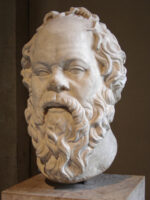
Greco-Roman ideas about the mind and its relation to experiencing reality and consciousness are deeply rooted in the philosophies of the pre-Socratic philosophers, Plato, Aristotle, and Epicurus. These ideas revolved around understanding the nature of the soul (psyche), mind (nous), and their roles in perception, cognition, and understanding the world.
Pre-Socratic Philosophers
The Pre-Socratics, active before Socrates (470–399 BCE), primarily focused on natural philosophy and the constitution of the universe. While not explicitly dealing with consciousness in the modern sense, their inquiries set the stage for later explorations of the mind and reality. Thales, Anaximenes, and Heraclitus, for instance, speculated about the fundamental elements of nature and how human perception of these elements forms our understanding of reality. While pre-Socratic philosophers mainly focused on understand the cosmos, for most of them, life is about experiencing reality and it ended at death.
Plato
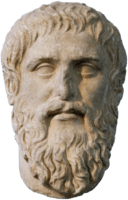
Socrates’ student Plato, born 428 BCE, introduced a dualistic view of reality, dividing it into the world of the Forms (ideal, eternal, and unchangeable realities) and the physical world (changeable and imperfect). For Plato, the soul is immortal and pre-exists before inhabiting a body, possessing innate knowledge of the Forms. Consciousness and the mind’s ability to experience reality are thus grounded in the soul’s recollection of the Forms. The rational part of the soul (logistikon) is responsible for reasoning and is the highest form of knowing, which contrasts with perception through the senses, considered less reliable for understanding truth. For Plato, the soul, very similar to the modern counterparts, took center stage. While life included experiencing reality, true life is about your eternal life.
Aristotle
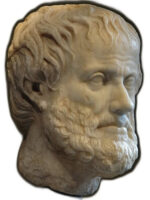
In contrast, Plato’s student Aristotle, born 384 BCE, offered a more integrated view of the body and life energy compared to Plato. Despite modern scholar’s attempts to rewrite history, he famously did not believe in a soul, nor an afterlife. His “life energy” idea was the “form” of a living being, its essence that enables it to perform its vital functions. Aristotle’s concept of the mind (nous) was tied to his theory of perception and cognition. He believed that the mind has the potential to become all things, through the process of abstraction, where the mind abstracts the form of an object from its sensory impressions. For Aristotle, true knowledge comes from observations about reality. For him, the senses and perceptions took center stage. Life is about experiencing reality through your senses.
Epicureanism
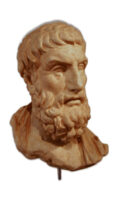
Epicurus, born 341 BCE, and his followers posited a materialistic view of the mind, seeing it as composed of atoms, like the rest of the body and the universe. Consciousness and sensory experiences arise from the interaction of atoms, with the soul being responsible for sensation and thought. Epicureanism emphasized the pursuit of pleasure and avoidance of pain as the foundation of a good life, with a clear consciousness free from fear and disturbance as essential to achieving this goal. Life is about experiencing reality with open eyes. They stressed that there was no need to fear death because while life ends at death, the time after your death is no different than the time before your birth.

These Greco-Roman ideas on the mind, reality, and consciousness contributed significantly to the development of Western philosophical thought on the nature of experience, laying foundational concepts that would be refined and debated by later philosophers throughout history.
Eastern Philosophical Thoughts on Consciousness
Eastern philosophies offer a deeply introspective and spiritual exploration of consciousness, contrasting with the Greco-Roman focus on logic and empirical observation.
Laozi
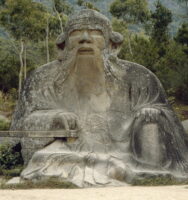
Laozi, traditionally regarded as the founder of Taoism and the author of the “Tao Te Ching,” focused on the concept of the Tao, or the Way, as the fundamental, ineffable principle that underlies and unifies the universe. Laozi’s philosophy emphasizes living in harmony with the Tao, which involves a deep understanding and acceptance of the natural flow of life. He viewed true wisdom and inner peace as arising from a state of non-action (wu-wei), where actions are in complete alignment with the Tao, leading to a profound connection with the natural world and an intuitive grasp of reality. For Laozi, understanding true consciousness is unknowable. Life is about the flow of nature and living in harmony with the cosmos. His ideas on the unknowable Dao are reflected in the modern epistemological idea that language is inadequate to describe reality.
Confucius
Confucius, born in 551 BCE, is one of the most influential philosophers in Chinese history, primarily concerned with ethics, social harmony, and the proper conduct of human affairs. While not explicitly focusing on consciousness in a metaphysical sense, Confucius’s teachings deeply impact one’s awareness of self and society. For him, ideas about your consciousness ere less relevant, and life is about cultivating your moral character and achieving a harmonious society.
The Buddha
Siddhartha Gautama, known as the Buddha, founded Buddhism in the 5th century BCE, offering profound insights into the nature of suffering and the mind. The Buddha’s teachings on consciousness center around the concept of non-self. His doctrine of Anatta or “non-self,” which sees humans as an impermanent composite of ever-changing processes, refutes the idea of a permanent, fixed self. This philosophy is central to Buddhist thought and underscores the idea that what we perceive as the ego or self is nothing but an illusion, a misinterpretation of the continuous flux of life. For the Buddha, consciousness was not based on a soul. Life is about figuring out how to manage suffering using your mind, your consciousness. Finally, while the Buddha believed in rebirth, he did not believe in reincarnation. Your life force, in Aristotle’s terms, or “energy” in the Buddha’s goes on to the next life, but not you because the idea of “self” does not exist.
Islamic Golden Age Thoughts on Consciousness
The Islamic Golden Age ushered in a period of unparalleled intellectual achievement, marked by profound inquiries into the nature of consciousness, the soul, and the physical world. Philosophers like Al-Farabi, Avicenna, and Alhazen played crucial roles in this exploration, blending the rich heritage of Islamic thought with the philosophical traditions of the Greeks.
Al-Farabi
Al-Farabi, known as the “Second Teacher” after Aristotle, extended and refined Plato’s ideas on a soul and afterlife. He made significant contributions to Islamic Neoplatonism and is celebrated for his works on political philosophy and metaphysics. In his view, the intellect plays a central role in achieving true knowledge and understanding the divine. Al-Farabi distinguished between the active intellect (an aspect of the divine mind accessible to humans) and the human intellect, proposing that enlightenment and the perfection of the soul are achieved through the intellect’s purification and its union with the active intellect. For Al-Farabi, consciousness is linked to the impressions of life, to experience. While his efforts were based on religious beliefs, he set the stage for a modern scientific approach based on impressions. Eventually, the impressions of life become the experience of life. For some, the experience of life is consciousness, but for Al-Farabi, the soul was still integral.

Avicenna
Avicenna, perhaps the most influential of all Islamic philosophers, made groundbreaking contributions to the philosophy of the soul and the mind. In his monumental work, “The Book of Healing,” he explores the nature of the soul, distinguishing between the rational and the empirical aspects of the mind. Avicenna proposed that the human soul is immaterial and rational, capable of existing independently of the body, a notion that prefigures modern ideas of consciousness. He introduced the thought experiment known as the “Floating Man” to argue for the existence of the soul independently of the physical body, suggesting that even without sensory input, one can be aware of one’s existence. For Avicenna, consciousness and the essence of being human is about an eternal soul.
Alhazen (Ibn al-Haytham)
Alhazen is best known for his pioneering work in optics, but his contributions to the understanding of vision and perception also offer valuable insights into consciousness. With his work, humanity went from believing in magic light emitting eyes kind of like modern flashlights, to understanding that our senses receive and interact with an external world. This shift in the right direction helped later scholars understand that an element of consciousness is our senses and our perceptions about the things we sense. For Alhazen and later scholars, part of consciousness is a stream of impressions representing reality.
From Enlightenment to Pre-Modern Thoughts on Consciousness
The period from the Enlightenment to pre-modern times was marked by profound shifts in the understanding of consciousness, paving the way for the birth of psychology as a distinct scientific discipline. Philosophers like Descartes, Hume, and Kierkegaard contributed significantly to this transition, each adding a unique perspective to the evolving narrative.
René Descartes
René Descartes, born 1596, is often hailed as the father of modern philosophy. His famous dictum,
“I think, therefore I am,”
places consciousness and the thinking self at the center of philosophical inquiry. Descartes’ methodical doubt and dualistic distinction between mind and body set the stage for subsequent discussions on the nature of consciousness and its relationship to the material world. For Descartes, the mind’s ability to think and be aware of itself was the undeniable proof of existence, establishing a foundation for exploring consciousness that is distinct from the empirical world. In Chapter 22 of “30 Philosophers,” I reforge his thought experiment from an irrational belief in evil demons to an empirical approach. The interesting thing is that both his God-based version and my scientific-based version ended up starting in a Material World and sensing it empirically.
David Hume
David Hume, born 1711, a leading figure of the Scottish Enlightenment, brought a critical empirical perspective to the study of the mind. He is the person in history that gets the most credit for our understanding that the “experience of life” is a set of impressions. That all knowledge originates from basic impressions—vivid perceptions of the external world—and ideas, which are fainter copies of these impressions. His work laid the groundwork for understanding consciousness as a stream of experience, influenced by both external sensory inputs and internal reflections. For Hume, consciousness is a serious of impressions.
Søren Kierkegaard
While Kierkegaard, born 1813, is not an Enlightenment philosopher in the strictest sense, I wanted to conclude this section with him because of his work on “angst.”

I think it’s pretty clear that work pushed humanity toward a modern understanding of psychology. His existential exploration of angst and the individual’s subjective experience was a precursor to modern psychology. His focus on personal choice, responsibility, and the existential dread of making meaningful life decisions highlighted the depth and complexity of human consciousness beyond mere rational or sensory experiences. A few decades after Kierkegaard, in 1879, Wilhelm Wundt established the first psychology laboratory in Leipzig, Germany, marking the formal inception of psychology as a scientific field. For Kierkegaard, consciousness is driven by anxiety and it’s that angst you should use to guide your life along with a deep belief in a Christian God and the journey of an eternal soul to heaven.
Modern Philosophical and Scientific Thoughts on Consciousness
The exploration of consciousness has evolved significantly with the advent of modern philosophy and science, blending intricate philosophical inquiries with rigorous scientific investigation. Philosophers like Spinoza, Nietzsche, and Sartre, each in their unique way, have contributed to our understanding of consciousness, paving the way for contemporary scientific efforts to unravel its mysteries.
Baruch Spinoza
Spinoza’s material world view offers a monistic perspective, arguing that everything that exists is part of a single substance which he identifies with God or Nature. This view posits that mind and body are not separate entities but two aspects of the same reality. Spinoza’s philosophy suggests that understanding the material world and our place within it is crucial to understanding consciousness.
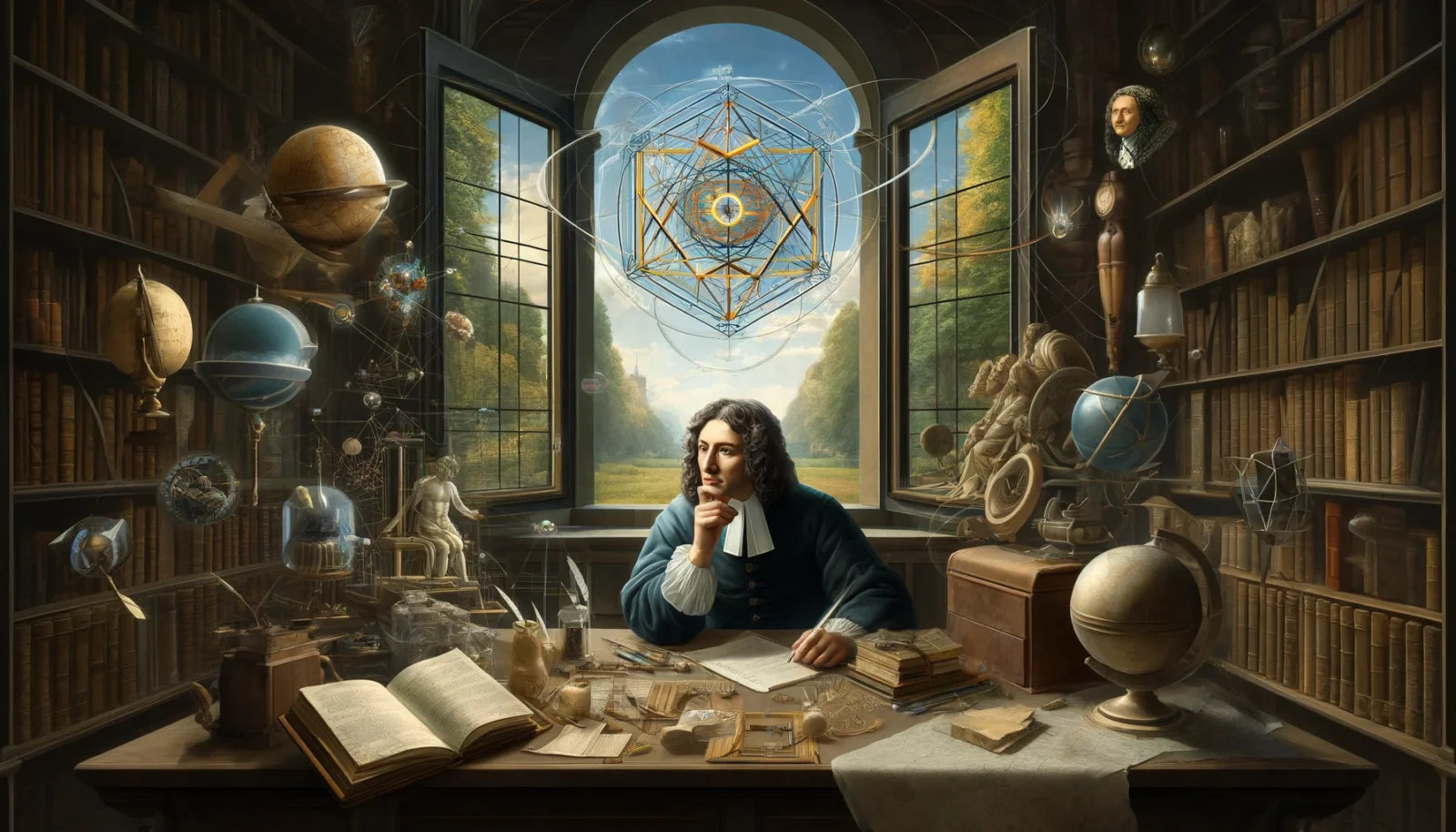
His emphasis on the interconnectedness of all things and the deterministic nature of the universe has influenced modern scientific approaches to studying consciousness, encouraging a holistic view of the mind as not separate from, but deeply embedded in, the physical world.
Friedrich Nietzsche
Nietzsche introduced a modern skeptical view, emphasizing the subjective nature of reality and consciousness. He argued that life is perceived through “cloudy lenses” of social constructs and personal interpretations, challenging the notion of objective truth.

Nietzsche’s philosophy invites individuals to confront the nihilism that comes with recognizing the constructedness of values and meanings, urging them to create their own authentic existence. His work underscores the importance of personal perspective and emotional response in the fabric of consciousness, highlighting the complex interplay between societal influences and individual authenticity in shaping our experience of reality.
Jean-Paul Sartre
Sartre, representing a philosophical-psychological view, famously declared “existence precedes essence,” suggesting that individuals first exist and then define themselves through their actions and choices. This existentialist perspective views consciousness as characterized by freedom and responsibility, with the self being a project continuously crafted by one’s own choices. Sartre’s ideas on consciousness focus on the individual’s experience and the inherent angst and freedom in creating meaning in an indifferent universe, contributing to a nuanced understanding of the psychological dimensions of human existence.
Modern Scientific Efforts: The Reductive Approach
Contemporary scientific exploration of consciousness increasingly adopts a “reductive” approach, aiming to understand consciousness by dissecting its components and examining their interactions. This approach leverages advancements in neuroscience, cognitive science, and psychology to investigate how brain processes correlate with subjective experiences, seeking to identify the neural substrates of consciousness. Through techniques like functional magnetic resonance imaging (fMRI) and electroencephalography (EEG), scientists are beginning to unravel the complex web of neural activities that give rise to conscious thought, emotion, and perception. The reductive approach also explores how consciousness emerges from and influences cognitive processes, including attention, perception, and decision-making, offering insights into the brain’s capacity to integrate information and generate the cohesive experience of a unified self. This scientific endeavor, while challenging, holds the promise of demystifying consciousness by elucidating its biological underpinnings, bridging the gap between philosophical speculation and empirical evidence.
— map / TST —
Further Reading:
- Consciousness: From the Soul to the Abyss – For an overview of my take on consciousness.
- The Consciousness Evolution Timeline – For a visual look at the evolution of consciousness in animals.
- Mindscape Framework – For a look at the framework that guides my thoughts on consciousness.















